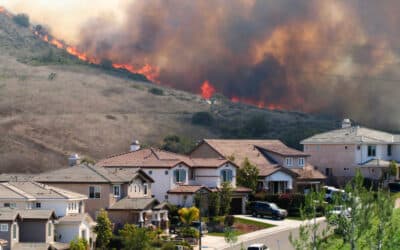California’s wildfire seasons are growing longer and more intense each year, putting unprecedented financial pressure on...
A Helpful Guide to Understanding Homeowners Association (HOA) Insurance Obligations and Responsibilities

As a homeowner in a Homeowners Association (HOA), it’s crucial to be aware of your insurance obligations. A thorough understanding of what’s included in the HOA’s insurance and what you need to insure yourself against can help you avoid any unexpected expenses in the case of a disaster or accident.
Below, you’ll learn about the usual coverage provided by a HOA’s insurance policy and the potential gaps that may exist. Also, discover what kind of homeowner’s insurance policy you should consider purchasing to ensure that you have adequate coverage for your personal property, liability, and other potential risks.
By gaining a comprehensive understanding of your insurance responsibilities as an HOA homeowner, you can protect your investment and have peace of mind.
Types of Insurance Coverage Provided by HOAs
A homeowners association (HOA) is responsible for managing and maintaining the common areas of a community, such as shared facilities, landscaping, and amenities. One important aspect of HOA management is insurance coverage. Here are a few examples of the types of insurance coverage provided by an HOA.
Master Insurance Policy
The most common type of insurance coverage provided by an HOA is a master insurance policy. This policy typically covers damages to the building structure, liability claims, and certain types of natural disasters. The HOA is responsible for paying the premiums for this insurance policy.
The master policy is responsible for covering any damage to the exterior of the building, such as damage caused by a storm or a fire. However, it is important to note that the master policy does not cover the interior of individual units or the personal belongings of residents.
Liability Insurance
Liability insurance is another type of insurance coverage provided by HOAs. Liability insurance covers the costs associated with a lawsuit or settlement arising from an injury or property damage that occurs in the common areas of the community. For example, if a visitor slips and falls in the community pool, the HOA’s liability insurance would cover the medical expenses and any legal costs associated with the incident.
Workers’ Compensation Insurance
If an HOA has employees, it is required to have workers’ compensation insurance. This insurance covers medical expenses and lost wages for employees who are injured on the job.
Directors and Officers (D&O) Insurance
Directors and Officers (D&O) insurance is another type of insurance coverage provided by HOAs. D&O insurance covers the costs associated with legal action taken against the HOA’s board of directors. This coverage protects board members from personal financial losses due to legal claims made against them in connection with their role on the board.
Homeowner’s Insurance Needs in an HOA
It’s important for homeowners to understand their insurance needs when living in an HOA community. Here are some types of insurance coverage a homeowner may need while living in an HOA:
Homeowner’s Insurance
Homeowner’s insurance provides coverage for damage to the interior of the unit, personal property, and liability claims. The HOA is typically not responsible for insuring individual units or personal property.
Therefore, it is crucial for homeowners to obtain their own homeowner’s insurance policy to cover their personal belongings and any damage that may occur to their unit. Homeowners should ensure that their policy covers any unique features or upgrades to their unit.
Flood and Earthquake Insurance
Floods are one of the most common natural disasters in the United States, and standard homeowner’s insurance policies do not typically cover flood damage. Homeowners living in areas that are prone to flooding should consider purchasing flood insurance.
Earthquake insurance is another type of insurance coverage that homeowners should consider, especially if they live in an area that is prone to earthquakes, such as Southern California. Standard homeowner’s insurance policies do not cover damage caused by earthquakes. Earthquake insurance can provide coverage for damage to the structure of the home, personal property, and additional living expenses.
Liability Insurance
Liability insurance provides coverage for legal fees and damages that may result from bodily injury or property damage caused by the homeowner. Homeowners living in an HOA community should consider liability insurance to protect themselves from potential legal action resulting from an accident that occurs on their property.
Important note: Since insurance companies usually look at the number of claims filed in the past three years to determine insurability and the cost, it is advised to have a high deductible in order to reduce the number of claims filed.
Insurance Responsibilities for HOA Board Members
As members of the board of a homeowners association (HOA), board members have certain insurance responsibilities to fulfill. These responsibilities may vary depending on the size and type of the HOA, but here are some common insurance responsibilities for board members:
- Maintain adequate insurance coverage: One of the primary responsibilities of board members is to ensure that the HOA has adequate insurance coverage. This includes maintaining insurance policies for the building structure, common areas, and any shared amenities, such as a pool or clubhouse. Board members should review the insurance policies regularly to ensure that they provide adequate coverage for the HOA’s needs.
- Manage insurance claims: Board members may be responsible for managing insurance claims filed by the HOA. This includes documenting the damage or loss, submitting the claim to the insurance company, and working with the insurance adjuster to ensure that the claim is processed correctly. Board members should also keep the HOA members informed about the status of the claim.
- Obtain additional insurance coverage if necessary: Board members may need to obtain additional insurance coverage for the HOA, depending on the type of community and the risks associated with it. For example, if the community has a playground, the board may need to obtain additional liability insurance to protect the HOA from potential lawsuits resulting from injuries sustained on the playground.
Understand HOA Insurance Responsibilities for Peace of Mind
By understanding their HOA insurance responsibilities, homeowners can ensure that their insurance policies cover any potential risks or damages. They can also identify any gaps in coverage and take steps to address them promptly. Additionally, a good understanding of HOA insurance responsibilities can help homeowners avoid potential legal issues that may arise in the case of property damage, accidents, or other unforeseen circumstances.
It’s very important for homeowners to be aware of their HOA insurance obligations and review their insurance policies regularly to ensure that they have adequate coverage. By doing so, homeowners can have peace of mind knowing that they are well protected in case of any unexpected events.
If you have questions about your HOA’s insurance policies or your own insurance needs, take a look at our other blogs, browse our services, or contact us to request a proposal.




